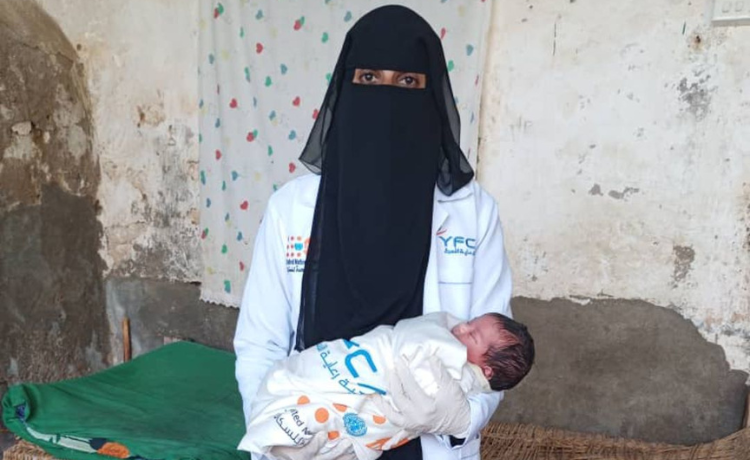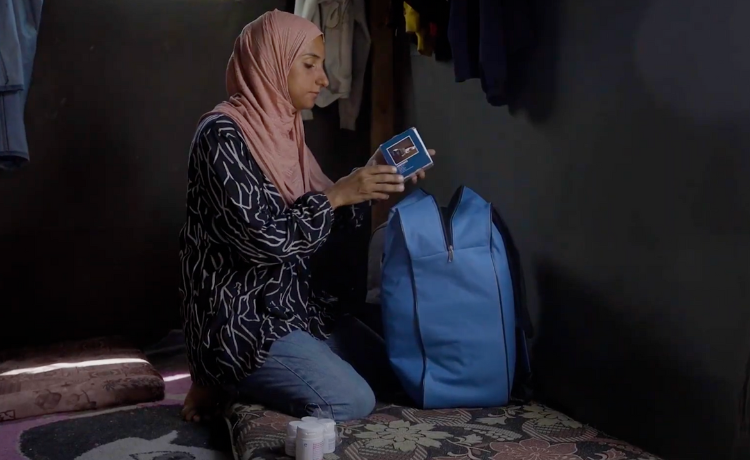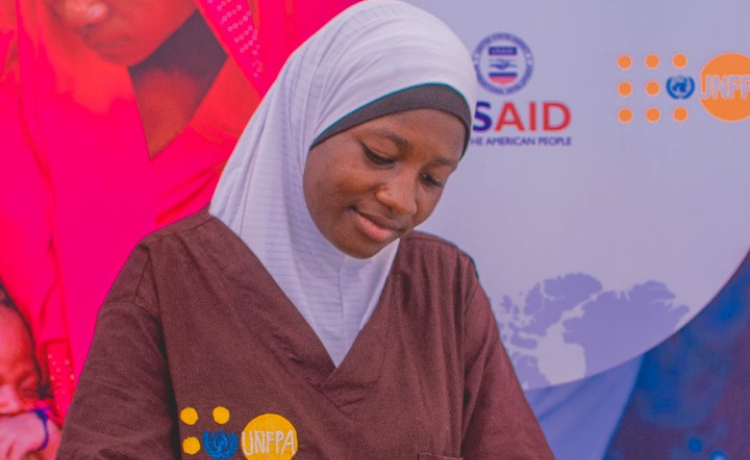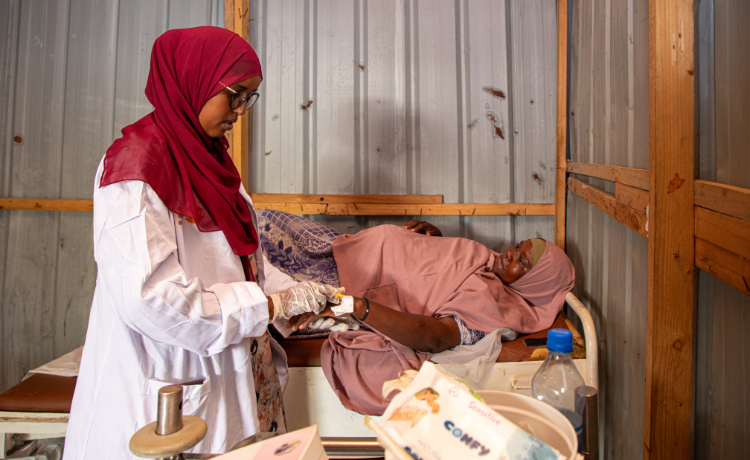News
Front-line midwives: Three reasons to support these humanitarian health workers amid a global funding crisis
- 02 May 2025
News
UNITED NATIONS, New York – “This week, I assisted 19 deliveries – two of which were life-threatening emergencies,” said Espérance, a midwife at Kyeshero General Hospital in eastern Democratic Republic of the Congo. “We're working in difficult conditions, with the fear of not being able to save everyone. But we're holding on.”
Each year, three quarters of all maternal deaths occur in just 25 countries, the majority of which are in sub-Saharan Africa and South Asia. Beset by conflict and climate disasters, most also rely on foreign aid structures to support their health systems – but as humanitarian funding is slashed across the board, life-saving services like those offered in Kyeshero are being severely pared back.
“We're not turning anyone away, but our capacity is exceeded,” explained Dr. Fabrice Bishenge, the hospital's director. “We’re lacking everything, from blood bags to medicines. With the support of UNFPA and other partners we can still provide services, but for how long?”
With the help of UNFPA, the United Nations sexual and reproductive agency, the Kyeshero hospital is one of the few facilities in the conflict-ravaged North Kivu Province offering maternal care. As hundreds of thousands of people are displaced and cannot access even the most essential services, most hospitals have been forced to close due to insecurity, lack of supplies and staff who are displaced themselves.
“With the support of UNFPA and other partners we can still provide services, but for how long?”
It’s a scenario being played out in crisis contexts across the world, as facilities shutter and untold numbers of health workers lose their jobs – just as millions of people are in urgent need of their help. Yet as outlined in a new UNFPA initiative, there is vast evidence of a simple, life-saving and cost-effective solution: Training, employing and deploying more midwives.
1) The world risks a rollback on maternal health progress
Women and newborns in fragile and conflict-affected settings are twice as likely to die in pregnancy and childbirth, and account for over 60 per cent of maternal deaths globally.
Deep funding cuts will only exacerbate these numbers, as the already alarming shortage of some 900,000 skilled midwives is likely to grow. In Yemen, where six out of ten births take place without a midwife and four out of ten women don’t receive antenatal care, the maternal death rate is among the highest in the region.
Nora is one of only four skilled midwives on the island of Kamaran, in Al Hudaydah Governorate. She works at a UNFPA-supported health centre that serves some 5,000 women and girls across three villages. “I will walk through mud, ride through floods and fight against all odds – because every birth should be a story of joy, not sorrow,” she said.

The island’s dire lack of resources means that women with high-risk deliveries must take a boat across treacherous waters to the nearest hospital, followed by a long ambulance ride. Nora recalled a woman who went into labour with severe complications while on the nighttime boat transfer: With no equipment, Nora delivered the child safely, and both mother and baby survived.
“I will walk through mud, ride through floods and fight against all odds – because every birth should be a story of joy, not sorrow.”
But a lack of funds means UNFPA can’t continue supporting the health centre, costing Nora her job and placing the lives of many in her community in danger. Sadly, her case is far from an anomaly: Across Yemen, UNFPA will no longer be able to train or employ more than half of the 1,492 midwives planned for 2025, meaning over 590,000 women of childbearing age will lose access to a midwife, and some 2.3 million people will be impacted overall.
2) Because job losses will slash survival rates for millions of women and girls
Midwives are often the only health workers available in humanitarian settings – supporting safe deliveries, managing complications, offering contraception and caring for survivors of violence. When funding disappears, midwives can no longer work, health centres close and lives are lost.
UNFPA has already received reports of rising death rates among women and newborns in conflict zones and fragile contexts. In Gaza, Huda Shaban said, “Pregnant and nursing women are among the most vulnerable and in need of attention and guidance. As a midwife, I face challenges due to the severe shortage of medical supplies and the near-collapse of our healthcare system.”

Health centres across Gaza are overstretched, understaffed, and increasingly inaccessible due to the lack of ambulances, movement restrictions, evacuations and security threats. Scaling up community midwifery is therefore more critical than ever to ensure women can access care when they need it most.
“No hospitals are currently admitting pregnant women, leaving them without access to regular prenatal care,” added Ms. Shaban, who received training from UNFPA. “There are very few clinics available, and the existing medical points provide minimal attention to pregnant women.”
With the loss of US funding, UNFPA will likely only be able to deploy 63 of the 93 midwives it had planned to in Gaza in 2025, who also won’t receive the equipment they need to effectively carry out their work.
3) They are cost-effective, life-saving healthcare
Reaching universal health coverage by midwives could avert two thirds of maternal and newborn deaths, contribute to lower healthcare costs, and lead to more productive workforces. Studies have shown that every $1 invested in midwifery yields up to $16 in returns, in lives saved, stability ensured and economies boosted.
“I’m entrusted with safeguarding life during its most vulnerable and miraculous moment – childbirth,” said midwife Halima Bukar Shettima in Borno, in northeast Nigeria. “My work goes beyond physical care – it’s about empowering women, fortifying families, and nurturing communities.”
Ms. Shettima is one of UNFPA's dedicated front-line midwives at a health facility in a displacement camp for people fleeing violence. “Each life saved tells a powerful story of resilience and the profound impact of compassionate care.”

Every midwife forced to abandon their studies, work or ambition because they are not being valued is another pregnant woman’s life put at risk. UNFPA’s new Midwifery Accelerator makes an urgent call for greater funding, training and advocacy for midwifery, including in crisis settings: Through skilled, respectful and evidence-based care, midwives must be at the heart of strong health systems.
“My work goes beyond physical care – it’s about empowering women, fortifying families, and nurturing communities.”
In Haiti’s capital Post-au-Prince, midwives are dedicated to delivering social services and psychological assistance alongside healthcare. But their ability to do so is constrained by relentless violence, looting and insecurity.
“Sexual violence is being used by gangs as a tool to instill fear and seize control of the bodies of women and girls,” said UNFPA Executive Director Dr. Natalia Kanem, noting that many hospitals have been forced to close because they are running out of medicine and staff.
In Port-au-Prince, midwife Naomie Noel is working on a UNFPA project supported by the Global Fund to prevent and screen for sexually transmitted infections, including HIV. “Faced with the scourge of HIV and AIDS, we need qualified, multidisciplinary healthcare professionals to provide care and implement far-reaching preventive measures to achieve the goal of zero new infections by 2030,” she explained. “Educating and raising awareness among young people and healthy adults about responsible sexual behaviour is important.”
“Support midwives”

In Somalia, midwife Nadifo Abdihakim Elmi works at a UNFPA-supported health centre and was called to a life-threatening emergency at a displacement camp outside the capital, Mogadishu.
“We can’t neglect a mother in critical condition – we have to act.”
“Our facility isn’t equipped for complications but we didn’t have time to take [the mother] to hospital, so we treated her at the camp with our medicines,” she told UNFPA.
Both mother and baby are safe, but it’s a scenario that could easily have gone another, more tragic way. “One of the challenges we face in crisis settings is that mothers can arrive in any condition. It’s difficult when you can’t fully help someone in need, but we can’t neglect a mother in critical condition.”
“In every crisis a country faces, it’s midwives who carry the burden,” she added. “In floods, we leave our homes to help mothers. In displacement, we follow and support them. No matter the crisis, midwives are always there.”
“Support midwives, so they can support mothers.”